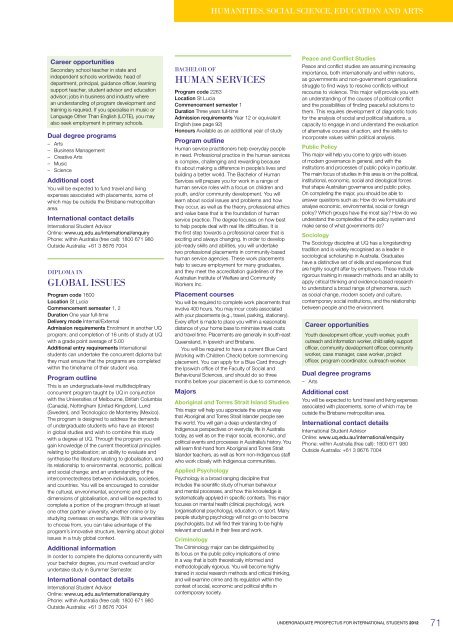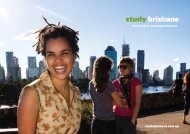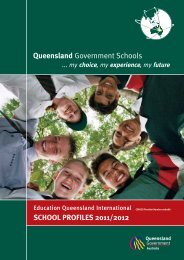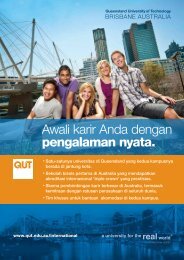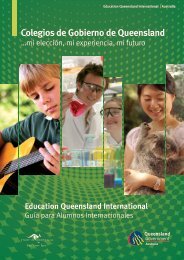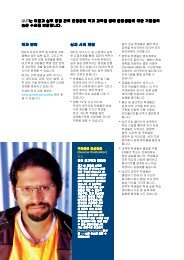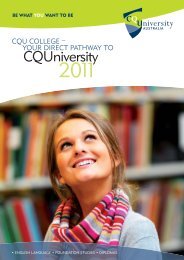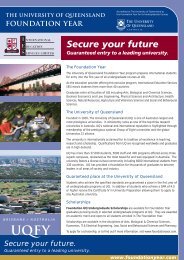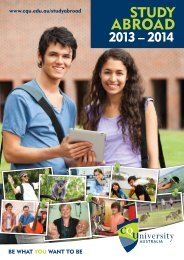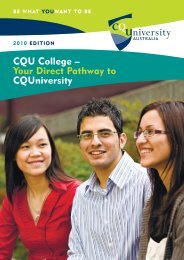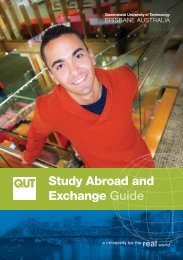UNDERgRADUATE PROSPECTUS - Study Brisbane
UNDERgRADUATE PROSPECTUS - Study Brisbane
UNDERgRADUATE PROSPECTUS - Study Brisbane
- No tags were found...
You also want an ePaper? Increase the reach of your titles
YUMPU automatically turns print PDFs into web optimized ePapers that Google loves.
Humanities, Social Science, Education and Arts<br />
Career opportunities<br />
Secondary school teacher in state and<br />
independent schools worldwide; head of<br />
department, principal, guidance officer, learning<br />
support teacher, student advisor and education<br />
advisor; jobs in business and industry where<br />
an understanding of program development and<br />
training is required. If you specialise in music or<br />
Language Other Than English (LOTE), you may<br />
also seek employment in primary schools.<br />
Dual degree programs<br />
– Arts<br />
– Business Management<br />
– Creative Arts<br />
– Music<br />
– Science<br />
Additional cost<br />
You will be expected to fund travel and living<br />
expenses associated with placements, some of<br />
which may be outside the <strong>Brisbane</strong> metropolitan<br />
area.<br />
International contact details<br />
International Student Advisor<br />
Online: www.uq.edu.au/international/enquiry<br />
Phone: within Australia (free call): 1800 671 980<br />
Outside Australia: +61 3 8676 7004<br />
Diploma in<br />
Global Issues<br />
Program code 1600<br />
Location St Lucia<br />
Commencement semester 1, 2<br />
Duration One year full-time<br />
Delivery mode Internal/External<br />
Admission requirements Enrolment in another UQ<br />
program; and completion of 16 units of study at UQ<br />
with a grade point average of 5.00<br />
Additional entry requirements International<br />
students can undertake the concurrent diploma but<br />
they must ensure that the programs are completed<br />
within the timeframe of their student visa.<br />
Program outline<br />
This is an undergraduate-level multidisciplinary<br />
concurrent program taught by UQ in conjunction<br />
with the Universities of Melbourne, British Columbia<br />
(Canada), Nottingham (United Kingdom), Lund<br />
(Sweden), and Tecnologico de Monterrey (Mexico).<br />
The program is designed to address the demands<br />
of undergraduate students who have an interest<br />
in global studies and wish to combine this study<br />
with a degree at UQ. Through the program you will<br />
gain knowledge of the current theoretical principles<br />
relating to globalisation; an ability to evaluate and<br />
synthesise the literature relating to globalisation, and<br />
its relationship to environmental, economic, political<br />
and social change; and an understanding of the<br />
interconnectedness between individuals, societies,<br />
and countries. You will be encouraged to consider<br />
the cultural, environmental, economic and political<br />
dimensions of globalisation, and will be expected to<br />
complete a portion of the program through at least<br />
one other partner university, whether online or by<br />
studying overseas on exchange. With six universities<br />
to choose from, you can take advantage of the<br />
program’s innovative structure, learning about global<br />
issues in a truly global context.<br />
Additional information<br />
In oorder to complete the diploma concurrently with<br />
your bachelor degree, you must overload and/or<br />
undertake study in Summer Semester.<br />
International contact details<br />
International Student Advisor<br />
Online: www.uq.edu.au/international/enquiry<br />
Phone: within Australia (free call): 1800 671 980<br />
Outside Australia: +61 3 8676 7004<br />
Bachelor of<br />
Human Services<br />
Program code 2263<br />
Location St Lucia<br />
Commencement semester 1<br />
Duration Three years full-time<br />
Admission requirements Year 12 or equivalent<br />
English (see page 92)<br />
Honours Available as an additional year of study<br />
Program outline<br />
Human service practitioners help everyday people<br />
in need. Professional practice in the human services<br />
is complex, challenging and rewarding because<br />
it’s about making a difference in people’s lives and<br />
building a better world. The Bachelor of Human<br />
Services will prepare you for work in a range of<br />
human service roles with a focus on children and<br />
youth, and/or community development. You will<br />
learn about social issues and problems and how<br />
they occur, as well as the theory, professional ethics<br />
and value base that is the foundation of human<br />
service practice. The degree focuses on how best<br />
to help people deal with real life difficulties. It is<br />
the first step towards a professional career that is<br />
exciting and always changing. In order to develop<br />
job-ready skills and abilities, you will undertake<br />
two professional placements in community-based<br />
human service agencies. These work placements<br />
help to secure employment for many graduates,<br />
and they meet the accreditation guidelines of the<br />
Australian Institute of Welfare and Community<br />
Workers Inc.<br />
Placement courses<br />
You will be required to complete work placements that<br />
involve 400 hours. You may incur costs associated<br />
with your placements (e.g., travel, parking, stationery).<br />
Every effort is made to place you within a reasonable<br />
distance of your home base to minimise travel costs<br />
and travel time. Placements are generally in south-east<br />
Queensland, in Ipswich and <strong>Brisbane</strong>.<br />
You will be required to have a current Blue Card<br />
(Working with Children Check) before commencing<br />
placement. You can apply for a Blue Card through<br />
the Ipswich office of the Faculty of Social and<br />
Behavioural Sciences, and should do so three<br />
months before your placement is due to commence.<br />
Majors<br />
Aboriginal and Torres Strait Island Studies<br />
This major will help you appreciate the unique way<br />
that Aboriginal and Torres Strait Islander people see<br />
the world. You will gain a deep understanding of<br />
Indigenous perspectives on everyday life in Australia<br />
today, as well as on the major social, economic, and<br />
political events and processes in Australia’s history. You<br />
will learn first-hand from Aboriginal and Torres Strait<br />
Islander teachers, as well as from non-Indigenous staff<br />
who work closely with Indigenous communities.<br />
Applied Psychology<br />
Psychology is a broad ranging discipline that<br />
includes the scientific study of human behaviour<br />
and mental processes, and how this knowledge is<br />
systematically applyied in specific contexts. This major<br />
focuses on mental health (clinical psychology), work<br />
(organisational psychology), education, or sport. Many<br />
people studying psychology will not go on to become<br />
psychologists, but will find their training to be highly<br />
relevant and useful in their lives and work.<br />
Criminology<br />
The Criminology major can be distinguished by<br />
its focus on the public policy implications of crime<br />
in a way that is both theoretically informed and<br />
methodologically rigorous. You will become highly<br />
trained in social research methods and critical thinking,<br />
and will examine crime and its regulation within the<br />
context of social, economic and political shifts in<br />
contemporary society.<br />
Peace and Conflict Studies<br />
Peace and conflict studies are assuming increasing<br />
importance, both internationally and within nations,<br />
as governments and non-government organisations<br />
struggle to find ways to resolve conflicts without<br />
recourse to violence. This major will provide you with<br />
an understanding of the causes of political conflict<br />
and the possibilities of finding peaceful solutions to<br />
them. This requires development of diagnostic tools<br />
for the analysis of social and political situations, a<br />
capacity to engage in and understand the evaluation<br />
of alternative courses of action, and the skills to<br />
incorporate values within political analysis.<br />
Public Policy<br />
This major will help you come to grips with issues<br />
of modern governance in general, and with the<br />
institutions and processes of public policy in particular.<br />
The main focus of studies in this area is on the political,<br />
institutional, economic, social and ideological forces<br />
that shape Australian governance and public policy.<br />
On completing the major, you should be able to<br />
answer questions such as: How do we formulate and<br />
analyse economic, environmental, social or foreign<br />
policy? Which groups have the most say? How do we<br />
understand the complexities of the policy system and<br />
make sense of what governments do?<br />
Sociology<br />
The Sociology discipline at UQ has a longstanding<br />
tradition and is widely recognised as a leader in<br />
sociological scholarship in Australia. Graduates<br />
have a distinctive set of skills and experiences that<br />
are highly sought after by employers. These include<br />
rigorous training in research methods and an ability to<br />
apply critical thinking and evidence-based research<br />
to understand a broad range of phenomena, such<br />
as social change, modern society and culture,<br />
contemporary social institutions, and the relationship<br />
between people and the environment.<br />
Career opportunities<br />
Youth development officer, youth worker, youth<br />
outreach and information worker, child safety support<br />
officer, community development officer, community<br />
worker, case manager, case worker, project<br />
officer, program coordinator, outreach worker.<br />
Dual degree programs<br />
– Arts<br />
Additional cost<br />
You will be expected to fund travel and living expenses<br />
associated with placements, some of which may be<br />
outside the <strong>Brisbane</strong> metropolitan area.<br />
International contact details<br />
International Student Advisor<br />
Online: www.uq.edu.au/international/enquiry<br />
Phone: within Australia (free call): 1800 671 980<br />
Outside Australia: +61 3 8676 7004<br />
UNDERGRADUATE <strong>PROSPECTUS</strong> FOR INTERNATIONAL STUDENTS 2012<br />
71


